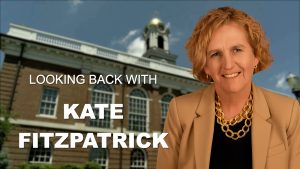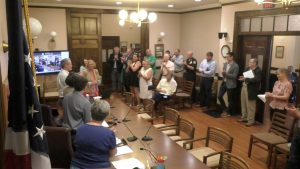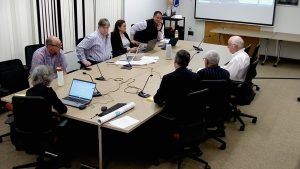May 18, 2023
• At the Needham School Committee meeting on May 9, 2023, representatives of the Needham Special Education Parent Advisory Council suggested there be more understanding in the schools because neurodivergent students are becoming drained after masking behavior that comes natural to them.
reported by Yuxiao Yuan
At the School Committee meeting on Tuesday, May 9th, representatives of Needham Special Education Parent Advisory Council (SEPAC) shed light on issues that require the collective effort from the school community to address.
Eighteen percent of students enrolled in Needham Public Schools are enrolled in Special Education programs. These students, who have physical, emotional, or sensory disabilities receive a wide range of services that offer instruction outside of general education classrooms. At one of the recent school committee meetings, parents praised the individualized programs district staff designed for their children. But, they also called for a culture shift within the general classroom environment.
SEPAC Co-Chair Pam Greenfield testified,”Walk the halls of the high school and you see signs of acceptance for so many affinity groups. You see posters in support of Black History Month, teachers have “This is a Safe Space” LGBTQIA stickers on their classroom doors. It’s beautiful to see and Needham should be proud. We are working hard to be a community of understanding and kindness to live up to the standards of the Portrait of a Needham Graduate. But where are the stickers for our kids? Where is the formal curriculum for neuro-divergence?”
Neuro-divergent is a term used to describe someone who thinks or behaves differently from what is considered typical. Parents and students who spoke out at the School Committee meeting referred to it as an invisible disability. A fifth grade student from Mitchell Elementary School spoke on behalf of her two brothers, both of whom have behavioral disorders. She urged the school to teach her peers about invisible disabilities.
“For example, ADHD, anxiety, autism, OCD, et cetera. Sometimes I feel like I have to teach my friends what my brothers have. No ten year old should have to do this. It’s a lot to manage.”
Her twin brother talked about frustrating experiences at school. “As someone who does not behave typically. I feel like in a way I get in more trouble than most of the kids in my class. Sometimes I have no idea what I’m in trouble for. Is there anything that can help?”
Parents mentioned their children have to mask themselves all day long at school to fit into the neurotypical environment. Jennifer Adreani, a parent from Needham High School, explained what masking entails. “They feel one way on the inside, but are really forced to show a very different face on the outside. They’re forced to walk through the halls of their schools, of their jobs, of their communities, of their life and act in a way that feels very wrong to them on the inside. The reason they’re forced to act that way is because neurotypical individuals around them are expecting certain things from them.”
Adreani further explained the stress and exhaustion caused by masking. “The analogy that I often make to people is if you travel to a foreign country and you don’t speak the language, you get to that foreign country, you’re surrounded by an unfamiliar culture, an unfamiliar language, unfamiliar food, and it is exhausting to spend the entire day trying to figure out, did I do the right thing? Did I say the right thing? Did I eat something I wasn’t supposed to eat? You get to your hotel at the end of the day and you just want to crash.”
SEPAC co-chair, Pam Greenfield empathized the need for proactive education to foster a moreinclusive environment for Special Education students. “We need our educators to give our kids the tools and the language to approach disabilities and differences in a kind and enlightened way. That’s how we start to shift the culture.”
School Committee members expressed gratitude for the speakers courage in sharing their personal experiences and agreed a change in school culture is necessary. Committee member Michael Greis shared,”The depth of your own stories, I think, helped. I mean, certainly helped me, but I think it will help other people who listen to understand. There’s a lot here and it’s not an easy challenge, but you’ve given us some, you know, good things to think about and wrestle with.”
Vice Chair Elizabeth Lee agreed. “I just wanted to say that I hear from you a shift in perspective saying that the Special Education here isn’t about fixing children, it’s about giving students tools to work in a neurotypical environment while also allowing their humanity to be shared and to be respected within the schools.”
SEPAC representatives also highlighted other issues such as Special Education students being unable to participate in many fine performing art programs due to conflicting schedules.
You can go to needhamchannel.org to watch the School Committee meeting and learn more about their requests.
• At the Needham School Committee meeting on May 9, 2023, representatives of the Needham Special Education Parent Advisory Council suggested there be more understanding in the schools because neurodivergent students are becoming drained after masking behavior that comes natural to them.





More Stories
ZBA Deliberates Tight Fit on Chestnut Street
Envision Needham Finds Resistance
Needham Open Studios Turns 25